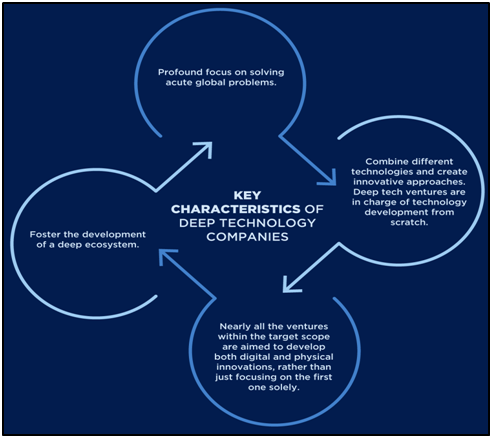National Deep Tech Startup Policy (NDTSP): To be Sent to Cabinet for Approval
06-01-2024
11:15 AM
1 min read

What’s in Today’s Article?
- Why in News?
- What is Deep Tech?
- Background in which the Draft NDTSP Released
- Key Highlights in the Draft NDTSP
- Issues with India’s ‘Deep Tech’ Startup Ecosystem

Why in News?
- According to the Principal Scientific Advisor, the government will be sending a note on a new ‘deep tech’ policy for India - National Deep Tech Startup Policy (NDTSP), in the coming weeks to the Union Cabinet for approval.
- In July 2023, the government unveiled a draft of the policy for public comment and following feedback from industry, a final version is reportedly ready.
What is Deep Tech?
- Deep technology/tech refers to advanced technologies based on some form of substantial scientific or engineering innovation.
- The innovations are "deep" in that they are sophisticated, very advanced answers to complex challenges or issues.
- Examples of deep-tech breakthroughs include genomics, robotics, nanotechnology and clean energy initiatives coming from research labs and academia.
- Deep-tech startups and companies seek to provide answers to complex problems through technologies and processes that typically require lengthy R&D cycles.
- Crucially, businesses and startups based on ideas that are easily replicable do not qualify as deep tech startups.
- Deep tech differs from high tech, which refers more broadly to technical innovations and advancements.
- High-tech companies are not necessarily focused on profound scientific or engineering breakthroughs.
Background in which the Draft NDTSP Released
- ‘Deep tech’ is a buzzword in tech and startup circles with no precise definition as yet.
- The PM's Science, Technology, and Innovation Advisory Council (PM-STIAC) recommended in 2022 for the creation of a National Consortium and a Working Group to propose -
- A comprehensive policy framework to address the needs and strengthen the Indian deep tech startup ecosystem.
- Chaired by the Principal Scientific Adviser (Prof. Ajay Kumar Sood) to the Government of India, the apex-level National Consortium represents a broad spectrum of stakeholders (from DPIIT, ISRO, DRDO, NITI Aayog, MeitY, etc).
- Under the overall guidance of the National Consortium, a draft version of the NDTSP has been developed through an extensive multi-stakeholder consultative process.
Key Highlights in the Draft NDTSP
- This policy complements and adds value to the existing Startup India policies, programmes and initiatives, by -
- Fostering a conducive ecosystem for deep tech startups to thrive and
- Addressing their unique and complex challenges.
- The draft NDTSP captures various new policy instruments and suggests necessary policy changes under the following themes:
- Nurturing Research, Development & Innovation
- Strengthening the Intellectual Property Regime
- Facilitating Access to Funding
- Enabling Shared Infrastructure and Resource Sharing
- Creating Conducive Regulations, Standards, and Certifications
- Attracting Human Resources & Initiating Capacity Building
- Promoting Procurement & Adoption
- Ensuring Policy & Program Interlinkages
- Sustaining Deep Tech Startups
Issues with India’s ‘Deep Tech’ Startup Ecosystem
- According to the draft ‘deep tech’ policy document, there are 10,298 startups (as of May 2023) recognised by the DPIIT and which are classified across various sub-sectors within the larger deep tech space.
- This means, only about 10% of startups are ‘deep tech’ currently. That is not a very good sign and it will take much more effort and handholding.
- One big problem for improving 'deep tech' startups is the lack of funding.
- Unlike startups focused on fintech or retail software, the quantum of funds needed is vastly larger.
Q1) What is the Prime Minister's Science, Technology, and Innovation Advisory Council (PM-STIAC)?
The PM-STIAC is an overarching Council that facilitates the Office of the Principal Scientific Adviser to the Government of India to assess the status in specific science and technology domains and advise the Prime Minister accordingly.
Q2) What are the issues faced by India's startup ecosystem?
Startups face significant challenges as a result of regulatory ambiguity, inadequate infrastructure, and difficulties scaling up operations. India's startup ecosystem continues to expand despite these obstacles, and several govt initiatives aim to support entrepreneurship in the nation.
Source: ‘Deep tech’ policy to be sent to Cabinet for approval, says scientific adviser | TechTarget | PIB


